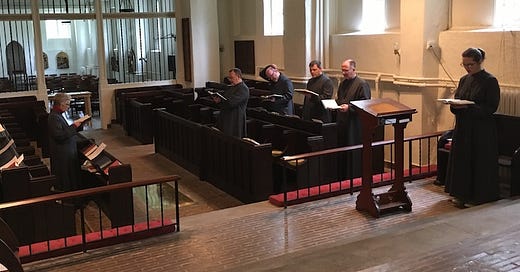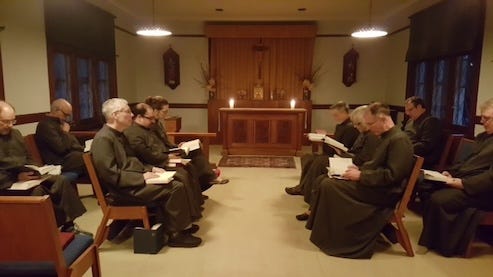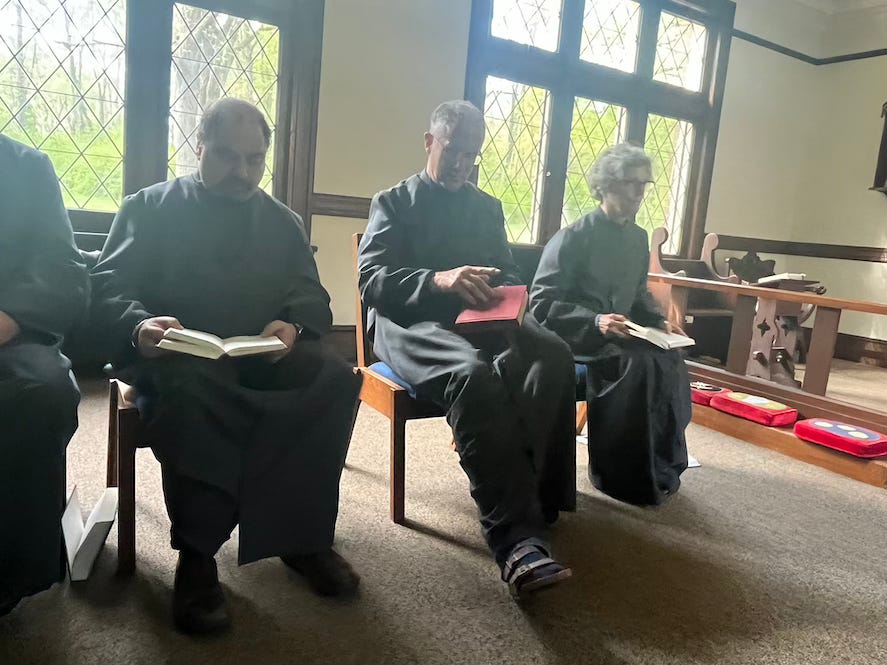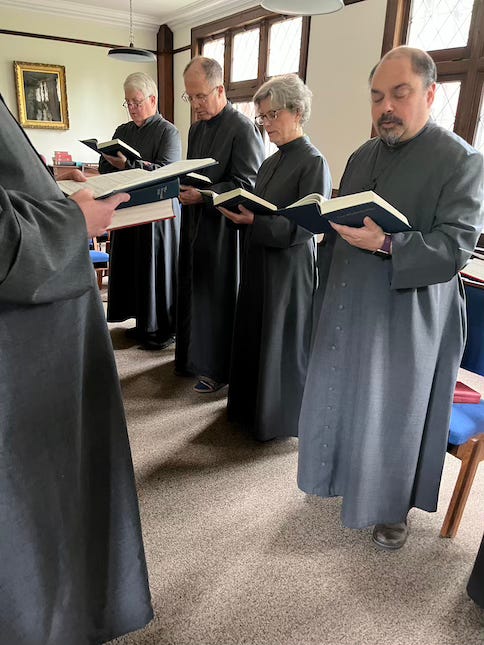These quotes are for your reflection. You may have been doing the Daily Office for 50 years or maybe you just started. Sometimes it helps to remind ourselves why we, and others, say the daily prayers of the church.
The key of the day
Prayer should be the key of the day and the lock of the night. - George Herbert
I am still trying
“I stumbled into the daily office when I was almost forty years old. And I have never quite recovered….. The world of prayer and contemplation to which I was introduced still draws me deeply, and I am still fooling with all of this, still convinced that there are deep truths buried here if I can just be smart enough, or patient enough or devout enough to dig them out. I am not much holier than I was before I began, but I am still trying nonetheless.” - Robert Benson
It has been my rock
Praying the office has revolutionized my spiritual life. The repetition of Canticles such as the Magnificat remind me of God’s faithfulness. Reading the various appointed Scriptures gives me an opportunity to read a wide swath of the Bible. This is exceedingly valuable when I have to preach: it reminds me of verses I might have forgotten about and gives me context for Scripture as a whole. Praying the office is not always exciting—I’ll be honest, some days, I don’t want to do it! But it has been my rock, a constant source of encouragement, inspiration, and hope during the times when things haven’t been going so well. I cling to it, and the words of these Canticles, Psalms, prayers, Scriptures, etc., stay with me throughout the day. - Melanie Rowell SCP
Objectivity
“The value of the Office is its objectivity. It is a means by which we pray with the whole church, uniting our prayer with that of millions of other Christians living and dead. This is true whether one is alone or in a group, for the Office is essentially a corporate act. It is objective too in that it does not depend on our feelings, but gives our prayer life a regularity and a disciplined framework.” True Prayer, Ken Leech
An order of love and justice
…a way by which we keep ourselves in constant awareness of the divine order; an order of love and justice which embraces and underlies all order - John Macquarrie
We can offer it even when we don’t believe
One of the lovely and healing things about the Office is that we can say it regardless of how we feel. We can offer it even when we don’t believe. Emily Wharton: God has gone away …
Adam Dalgliesh: My father was a parish priest. When I lost my faith he said, “If you find you can no longer believe just act as if you still do. If you feel you can no longer pray just go on saying the words.” — P. D. James, A Taste for Death
From In Your Holy Spirit: Shaping the Parish Through Spiritual Practice, Robert Gallagher, OA, Ascension Press
Life is a gracious gift of God
… some congregations employ the practice of the daily offices as a means of cultivating missional vitality. 45Christians gather, often in “third place” locations, in the midst of the day’s activities for brief periods of prayer, Scripture reading, and reflection.
This practice offers several benefits:
(1) members are daily shaped in the imagination that life is a gracious gift of God to be embraced and “a vocation to be lived in the presence of God and others”; 46
(2) members are assisted in remaining attentive to the competing demands of urban life and the many conflicting ways in which they disfigure our lives;
(3) amid the chaos and “grind” of urban life, it encourages Christians to cultivate a sense of pace and rhythm as they walk with God. - Direction: The Heart of God in the Heart of the City: Missional Vocation and the Urban Congregation
The ancient cycle of prayer
The real significance of the Divine Office is that in its recitation the individual or group enters the ancient cycle of prayer, by which day by day and hour by hour the church in the name of all creation adores and implores the eternal God - Evelyn Underhill
In the Hours, the royal priesthood of the baptized is exercised
The Liturgy of the Hours, also known as the Divine Office or the Work of God (Opus Dei), is the daily prayer of the Church .. a meditative dialogue on the mystery of Christ, using scripture and prayer. At times the dialogue is between the Church or individual soul and God; at times it is a dialogue among the members of the Church; and at times it is even between the Church and the world. … The two most important or hinge Hours are Morning and Evening Prayer. These each include a Gospel canticle: the Canticle of Zechariah from Luke 1:68-79 for Morning Prayer (known as the Benedictus), and the Canticle of Mary from Luke 1:46-55 for Evening Prayer (known as the Magnificat). … In the Hours, the royal priesthood of the baptized is exercised, and this sacrifice of praise is thus connected to the sacrifice of the Eucharist, both preparing for and flowing from the Mass. - "Liturgy of the Hours: The daily prayer of the Church" - United States Conference of Catholic Bishops
Love asks for time and attention
Prayer was understood to be the Opus Dei, the work of God, and nothing was to be preferred to it. Love, of course, was most important; but prayer, particularly praying the Divine Office, was thought to be the most excellent witness to the community's love of Christ. Human love asks for time and attention in order to be cultivated, and as humans we come to love someone as we come to know that person. The same is true in our relationship with God. Love of Him calls for time and attention to Him, and we come to love Him as we come to know Him in prayer. - "Infusing Prayer", Susan B. Haynes
The foundation for a parish’s health and faithfulness
“Our conviction is that the Daily Office and the Sunday Eucharist are the foundation for a parish’s health and faithfulness. The Office brings us into the pathways of grace. It roots us in the scriptures and the common prayer of the church. It is the heartbeat of the Body of Christ. It allows us to enter into the ancient rhythms of awe and adoration. It concretely connects us to the church throughout the world. It teaches us that our spiritual life is not dependent upon our feelings.” - The Daily Office Initiative, The Order of the Ascension
The duty of praying
The Apostle indeed admonishes us to pray without ceasing (1 Thessalonians 5:17), and with the Saints their very sleep should be a prayer. Nevertheless, we must set aside stated hours for the duty of praying. Then, should any occupation keep us away from it, the hour itself will remind us of that duty. - Saint Jerome, in 384
A conversation which includes both listening and responding, silence and words
All Christians are called to pray and common prayer is an important part of the life of prayer to which all believers are invited. Vatican II tried to re-introduce the laity to this important Prayer of the Church, the Divine Office, and in some parishes it met with success. In many others, though, the Divine Office remains an unknown reality and it is rarely or never prayed. Praying communities such as Christ in the Desert can hopefully encourage others, even those not committed to monastic or religious life, to at least consider incorporating some of the Divine Office into their daily lives.
When a community gathers to pray the Divine Office, it represents the entire Church at prayer. It is not to be seen as a sort of “pooling” of private prayers, but truly the Church praying as a body together with Christ her head, in the name of all and for all, thus being again the Church at prayer.
The structure of the Opus Dei is intended to promote between God and his people a conversation which includes both listening and responding, silence and words - "Theology of the Opus Dei" Monastery of Christ in the Desert
There is something that God wants us to hear
Rowan Williams maintains that there is something even in these texts that God wants us to hear: How can all of this be addressed by God to us? The simplest way in which we can understand this is the one I have already hinted at: this is what God wants you to hear. He wants you to hear law and poetry and history. He wants you to hear the polemic and the visions. He wants you to listen to the letters and to think about the chronicles. And from the earliest days, Christians, like Jews before them and like Jews now, wrestle with exactly how you can say, “This is the word of the Lord,” the communication of God. You cannot go by just surface meanings because surface meanings do not immediately help you with understanding why God wants you to hear it. This may be the word of God, but why exactly is it important to God that you know it? . . . If in that story we find accounts of the responses of Israel that are shocking or hard to accept, we do not have to work on the assumption that God likes those responses. . . . The point is to look at God, look at yourself, and ask where you are in the story. Are you capable—in the light of the Bible itself as a whole—of responding more lovingly or faithfully than ancient Israel? – Julia Gatta, “Life in Christ: Practicing Christian Spirituality.”
The complex and full experience of humanity’s relationship with God
“C. S. Lewis knew that we are inclined to twist things to serve our self-oriented inclinations. He wrote, “What we see when we think we are looking into the depths of scripture may sometimes be only a reflection of our own silly faces.” The Psalms offer a slight protection against such self-deception. We get to offer praise even when we least feel like it. We may join in language of anger and judgment and find ourselves wanting to run away from being that person. The Psalms draw us into the whole range of human experience and feeling. We are taken into the complex and full experience of humanity’s relationship with God. Dietrich Bonhoeffer wanted us to start with the assumption that the Psalms “have to do with Jesus Christ,” that we need to understand them as God’s Word. Such a starting place would allow us to pray the Psalms with Jesus Christ to the Father. He wrote, “It does not depend, therefore, on whether the Psalms express adequately that which we feel at any given moment in our heart. If we are to pray aright, perhaps it is quite necessary that we pray contrary to our own heart. Not what we want to pray is important, but what God wants us to pray.” -Michelle Heyne and Robert Gallagher, Finding God in All Things: Contemplation, Intercession, and Intervention
We are indelibly, unspeakably ONE.
I lost fear in the black belt when I began to know in my bones and sinews that I had been truly baptized into the Lord’s death and Resurrection, that in the only sense that really matters I am already dead, and my life is hid with Christ in God. I began to lose self-righteousness when I discovered the extent to which my behavior was motivated by worldly desires and by the self-seeking messianism of Yankee deliverance! The point is simply, of course, that one’s motives are usually mixed, and one had better know it. As Judy and I said the daily offices day by day, we became more and more aware of the living reality of the invisible “communion of saints”—of the beloved community in Cambridge who were saying the offices too, of the ones gathered around a near-distant throne in heaven—who blend with theirs our faltering songs of prayer and praise. With them, with black men and white men, with all of life, in Him Whose Name is above all the names that the races and nations shout, whose Name is Itself the Song Which fulfils and “ends” all songs, we are indelibly, unspeakably ONE. - Jonathan Daniels
Spending time listening to God’s voice is how we’re trained to recognize God’s voice
That makes it incredibly important that we train our sense of hearing so we resonate with the right frequency, if you will. To that end, we started the Brown Bag Bible Study on Wednesdays because studying sacred Scripture trains us to pick out God’s voice in the cacophony of Times Square. We learn its timbre and tone, its pace, and its pitch. The regular rhythm of the Daily Office prayed in the church each morning and evening includes reading almost all the New Testament every year and over half the Old Testament, which is spread over two years, steeping us in stories about God’s holiness, covenant faithfulness, wisdom, and love. We hear the voice of God in our readings at Mass, and we read the same passages day-by-day in Lent. Then we’re moved, in turn, to resonate—to act in sympathy with—these qualities wherever God may send us in New York City. Spending time listening to God’s voice is how we’re trained to recognize God’s voice.
And there’s never been a more important time to be able to detect that particular voice out of all the other voices that clamor for our attention. We are bombarded thousands of times a day with messages about what the world says is true and desirable. “If the biblical story does not control our thinking, then we will be swept into the story that the world tells about itself” (Lesslie Newbigin). I’m reminded of the old analogy about how Treasury agents are trained to detect counterfeit bills by handling real currency for hours on end—the trick is to get so familiar with the genuine article that any deviation stands out like a sore thumb. That’s why we listen so closely to the voice of God in sacred Scripture: It’s the legitimate exemplar by which we test the genuineness of every message. My sheep hear my voice, and I know them, and they follow me. (John 10.27)
From: Father Sammy Wood in his reflection on the vision statement of Saint Mary's Times Square. February 23, 2024
Daily Office - we’ve been doing this a long time
three days on the Cape
sharing the sacrament of coffee
doing morning prayer on a porch
from which I could see the ocean
the morning office spoken and laughed
as we read one another’s lines
or added comments to the Scripture
until my husband said from the other room
“that was lovely but I’ve never heard it done as stand-up before”
and you said “we’ve been doing this a long time”
and now I’ve fallen among monks
five days retreat where I could see a river
were I to walk that far
we pray five times a day
and here no one laughs at the mis-said lines
when guest or brother misses a cue
reads loudly into the silence
then fades—embarrassed perhaps
smiling I hope
and no one begins the reading
“now here’s a surprise—
the people did what was evil
in the sight of the Lord”
and no one slurps coffee
in the midst of confession
yet both catch me and hold
because these prayers are not woven by angels
but are built
every day every office anew
by human voice and hunger
the work of a people
who have been doing this
a long time
~abh~
Transfiguration 2002. Emery House
for Tom Barrington. for the Brothers at Emery House
- Amy B. Hunter wrote this poem on the Office that she shared with CDI participants. In Fill All Things: The Dynamics of Spirituality in the Parish Church, 2008, Robert Gallagher, OA







